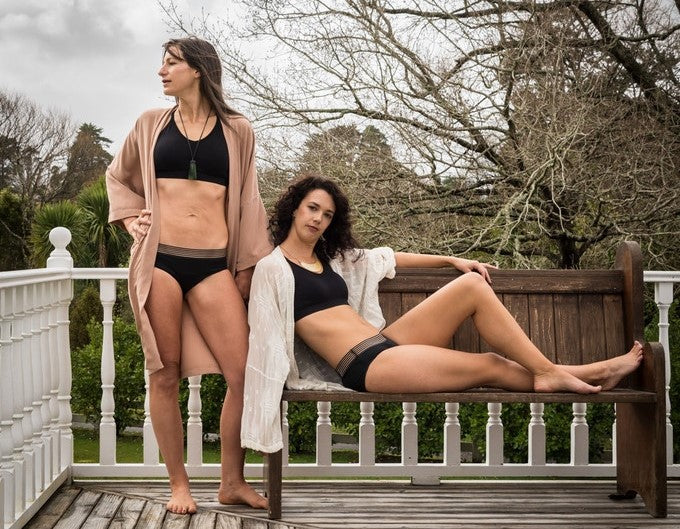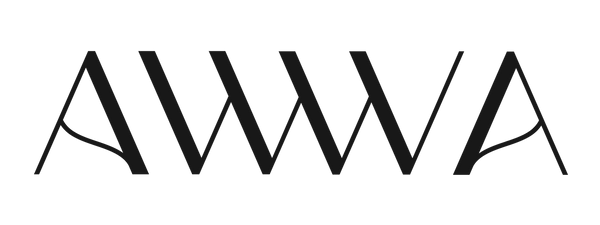
The NZ undies company tackling period poverty and whakamā

Kylie and Michele of AWWA / Rebekah Robinson for Villainesse
Founded in Te Atatu, ‘AWWA’ is the latest big thing on the NZ period scene. Perhaps they’re the first ‘big thing’ on the NZ period scene.
AWWA is a period-undies company. So, yeah, you bleed into these suckers. The company models their knickers on normal kiwi women – with normal kiwi bodies – who take centre stage in their advertising campaigns. There’s something subversively glamorous about these images, and on top of that, the company donates 5% of their product to NZ charities. I caught up with co-founder Michele.
Hi Michele! So… bleeding into your undies. How does that work, exactly?
It’s pretty easy really – AWWA are magical undies made from high-tech fibers that absorb liquid, dispel odours and prevent leaks. There are four magical layers, and they’re all paper thin, so you’d never know (and no one else will know) that you’re not wearing your everyday undies – you’re wearing your powerful mana wahine AWWA’s! It’s a great time to be alive as a menstruating woman!
I love the images you guys are putting out – images that I would say are gently (or perhaps not so gently) knocking the patriarchy off its pedestal. Tell me about the choice to showcase normal bodies in your marketing material.
The sanitary product industry has been, for the most part, run by men – so images and ads portraying women on their periods have long been depicted from a patriarchal perspective. Usually that means a perfectly domesticated and highly athletic white woman with an active social life. They often portray periods as an unclean, shameful and something that this superwoman should keep from the world. Unfortunately, all this has done is lead most women in 2019 to feel like they do not fit this ‘normal’ box and to believe that talking about and truly understanding their menstrual cycle is ‘whakamā’ or ‘unladylike’.
The reality could not be further from the truth. Your ikura (period) is not unclean or shameful. It’s a powerful reminder of your links to whakapapa (ancestors) and your ability to bring new life into the world and continue humankind. Now that’s something you don't see portrayed in tampon ads, eh?
The other reality is that plenty of women don’t feel like being particularly domestic or athletic on their period (or at all and, hey, that’s a reality too). Taking some time out and prioritising self-care when on your ikura, we believe, can have huge positive effect on girls and women.
Hiding your period from the world, and the idea that it’s ‘whakamā’ to speak of menstruation, has also lead to women not truly understanding their cycle, how to manage it, and why they may be experiencing things like irregular bleeding, heavy bleeding, and PMS. There’s currently very little in-school education around this topic and leaving it to the parents is all cool – but they didn't learn it all either!
AWWA tackles the super-relevant issue of period poverty in schools. Why was this important for you guys?
It’s important to us because it’s important. There’s really no other answer. There are other amazing NZ companies are doing their bit, like Wā Collective, Nope Sisters and Mycupnz, but why is this issue not being taken more seriously?
The toileting needs of [cis] men in schools and the workplace are taken care of free of charge, but women are left to fend for themselves if God forbid they have any toileting needs above and beyond what [cis] men need. Not being able to pay for these themselves and having to take time off crucial education and work leads to an even larger equality gap and mental health issues. This is 100% an equality issue that needs more support.
Period poverty may seem like a new challenge facing society but ask your mum or nana and they'll have a story too. But now we women are breaking down the patriarchal taboos, we are able to talk about things like period poverty and hopefully, collectively put an end to it.
If you were to completely eradicate period poverty from Aotearoa what would your next mission be?
To support the beginning of compulsory comprehensive in-school period-education for both girls and boys. Women need support when on their period and if boys were raised knowing this – wouldn’t the world be a better place?

